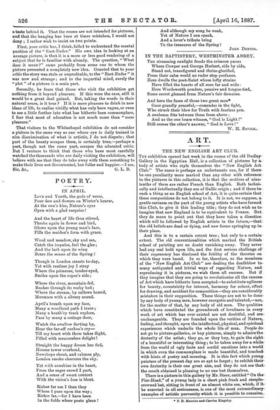ART IN WHITECHAPEL.
[To Tea Banos or Tom ..13rsouros."1
you allow me space to criticise one or two points in your article of April 9th on the above subject P To most of it no one could object; in fact, it ie rather surprising that an article saying so much that is true should yet leave so unpleasant
• Perhaps Thomas is a Peelite.—Ess. Spectator,
a taste behind it. That the rooms are not intended for pictures, and that the hanging has been at times mistaken, I would not deny ; I rather wish to insist on two points.
First, your critic has, I think, failed to understand the mental position of the " East-Ender." His own idea in looking at an average picture, is that it is a more or lees good rendering of a subject that he is familiar with already. The question, " What does it mean ?" came probably from some one to whom the picture presented a completely new idea. Granted that to your critic the story was stale or unprofitable, to the " East-Ender" it was new and strange ; and to the impartial mind, surely the "plot " of a picture is a main part.
Secondly, he fears that those who visit the exhibition get nothing from it beyond pleasure. If this were the case, still it would be a great deal gained. But, taking the words in their natural sense, is it true ? If it is mere pleasure to drink in new ideas of life, to realise vividly what has only been vague, or even to see a little farther into what has hitherto been commonplace, I fear that most of education is not much more than "mere pleasure."
That visitors to the Whitechapel exhibition do not consider a picture in the same way as one whose eye is daily trained in nice discrimination of what is artistic, I do not dispute; that part of the beauty escapes them, is certainly true,—perhaps a part, though not the same part, escapee the educated critic. But I venture to think that those who have most carefully watched the thousands who are daily visiting the exhibition, will believe with me that they do take away with them something to make their lives not discontented, but fuller and happier.—I am,



































 Previous page
Previous page